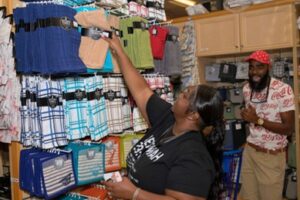Minister Glover-Rolle called the workshop a success as topics discussed were “as diverse and vast as the complete revamping and replacement of General Orders, the strengthening of child labour laws, the modernisation of Occupational Safety and Health Standards, the introduction of paternal leave, the development of modern, inclusive laws related to mental health and people living with disabilities, various amendments to the Employment and Industrial Relations Acts, and even the new Contributory Pension Plan, among many other topics.” She said, given the urgent need for change, the symposium was of pivotal importance — laying the foundation for the future of the Bahamian workforce.
REMARKS
BY
THE HONOURABLE PIA GLOVER-ROLLE, MEMBER OF PARLIAMENT FOR GOLDEN GATES AND MINISTER OF
LABOUR AND THE PUBLIC SERVICE
2024 LABOUR LEGISLATION SYMPOSIUM CLOSING
WEDNESDAY, 31 JULY 2024
Good Day,
I am so enthused about being here with you on the final day of this symposium.
It was such a pleasure to re-join you today for that very informative debriefing session.
That debrief left me feeling inspired and ready to get to work to bring this new labour era into fruition.
This symposium was conceived as an opportunity for dialogue, constructive feedback, and problem solving with our major stakeholders as we craft a modern labour and public service legislative agenda.
Based on the feedback I’ve been getting, this process has largely been a success.
And that is thanks to your willingness to engage in passionate, insightful, and honest discussions on the way forward.
You’ve discussed topics as diverse and vast as the complete revamping and replacement of General Orders, the strengthening of child labour laws, the modernisation of Occupational Safety and Health Standards, the introduction of paternal leave, the development of modern, inclusive laws related to mental health and people living with disabilities, various amendments to the Employment and Industrial Relations Acts, and even the new Contributory Pension Plan, among many other topics.
modern, inclusive laws related to mental health and people living with disabilities, various amendments to the Employment and Industrial Relations Acts, and even the new Contributory Pension Plan, among many other topics.
I don’t believe any area of our labour and public service framework that requires change was left untouched.
Most importantly, we were able to capture the full range of opinions on each topic, so that as we move forward with this process, we will have a complete picture of the various perspectives on the issues at hand and be better informed to make the most important decisions.
The agitation and advocacy for reforms we’ve all done from within our respective lanes in recent years has culminated in this first ever Labour Legislative Reform Symposium, which will now provide a strong starting point as we modernise and strengthen our labour and public service laws.
The timing of this symposium is so critical. Each day that goes by that we fail to enact these changes is another day that we fall further behind the mark for 21st century innovation and excellence.
Given the urgent need for change, this symposium represents one of the most critical components of our agenda. During my very first budget speech in the House of Assembly, I declared that our work would be so comprehensive that no law, order, or regulation would be deemed too sacred to touch. Since then, we’ve been hard at work within the Ministry, and I know that you have all been working in your respective organizations, to drive change on behalf of Bahamian workers.
However, as productive as we have been individually, our best work happens when we work together. And that is what this week was all about – working together for the common good.
We should be very proud of what we’ve been able to accomplish, not just this week, but in the less than three years since this administration first took office.
We should be proud because around the region and across the world, countries are discussing doing many of the things we have already done or are currently taking action on.
As I said on Monday, we have been recognised regionally and internationally for the progress we have made. Now that we have taken this important step forward with this Legislative Reform Symposium, we will keep the momentum going.
The levels of cooperation and collaboration we experienced this week sets the tone for how we must work together going forward. When we are all willing to come to the table in the spirit of collaboration, compromise, and solutions-oriented discussions, it is Bahamian workers who benefit most.
Just think about what we’ve been able to accomplish today. When these laws are fully developed and implemented, there may be children who are better protected from exploitation.
There may be workers who were unfairly dismissed or who received ill-conceived severance packages that will be empowered to take action. There may be fathers who will receive paternity leave for the first time ever to help shoulder the load and bond with their newborns.
We will truly tap into the power of Labour as a force for social good. It is all up to us.
As the Ministry of Labour and the Public Services takes the next steps in this process, we will continue to maintain open channels of communication and demonstrate a willingness to engage and collaborate as we create the first-ever Labour Legislative Reform White Paper that will be submitted to Cabinet.
In the near future, when the various proposed amendments and new laws are drafted, we will provide another opportunity just like this one, to review the drafts before they are tabled in Parliament to get your valued input.
We are well aware of that fact that it is the participation of our stakeholders that has facilitated our current levels of success, and we will ensure that we continue to engage with you every step of the way.
I’d like to thank everyone present for your participation and support.
Thank you to PS Gina Thompson for her steady leadership and thank you to the staff of the Ministry of Labour and the Public Service for working each day toward our shared vision. Thank you to Director of Labour, Howard Thompson, who has had a very productive first year in the Director’s seat.
He and his team at the Department of Labour will be pivotal to our success.
And, of course, a big thank you goes out to Mr. A. Robert Farquharson and team for their support in making this event happen. Thank you to the ones whose efforts have informed the conversations we’re having today: our dynamic HR strategists, including Nathaniel Butler, Simmone Bowe, Marilyn Brennen, Wellington Hepburn, Cherrylee Pinder, and Patrice Taylor for taking the lead on organizing this symposium, as well as Kendenique Campbell Moss for her assistance with PR and logistics and the protocol team who always ensures that we dot our i’s and cross our t’s.
I’d also like to thank every stakeholder that showed up to support this process: from the trade unions to the government agencies and state-owned enterprises. Thank you, as well, to the National Tripartite Council, the Employers’ Confederations, and all of our tripartite partners.
Over the past three days, we laid the foundation for the future of the Bahamian workforce. It is now up to us to act swiftly to build on this foundation.
Let’s move forward with same enthusiasm and intensity that we displayed this week, and we will bring about a brighter and better future for Bahamian workers.
I wish God’s blessing on each of you and the work that you do to move this nation forward. Thank you, once again. And may God bless the Commonwealth of The Bahamas.




 News13 hours ago
News13 hours ago
 TCI News3 days ago
TCI News3 days ago
 TCI News1 week ago
TCI News1 week ago















